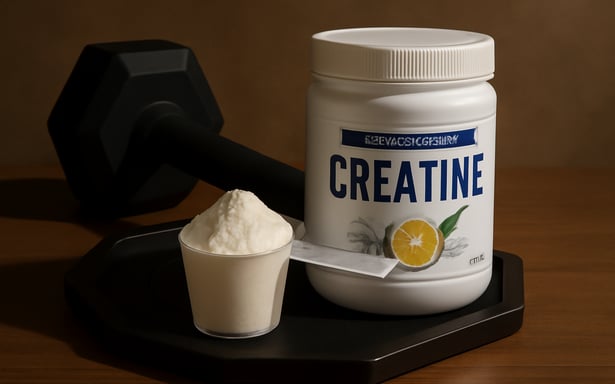What Is Creatine and How Does It Work?
If you've spent any time in the gym or scrolling fitness content, you've definitely heard the word creatine thrown around. It’s one of the most researched, trusted, and effective supplements in the fitness world — but what exactly is it? And how does it actually work to boost your performance?
CREATINE
4/14/20252 min read
Creatine is one of the most widely used and scientifically supported supplements for enhancing athletic performance and muscle growth. But what exactly is it, and how does it function?
What is Creatine?
Creatine is a naturally occurring compound found primarily in muscle cells. It's synthesized in the liver, kidneys, and pancreas from amino acids such as glycine, arginine, and methionine. While our bodies naturally produce creatine, it can also be obtained from dietary sources like red meat and fish, as well as supplementation.
How Does Creatine Work?
Creatine mainly helps muscles produce and sustain energy, especially during short bursts of high-intensity exercise. Here’s an easy-to-follow explanation:
Quick Energy Source:
Muscles need energy to contract, and they get this energy from a molecule called ATP (adenosine triphosphate).
When muscles use ATP for energy, ATP loses a phosphate molecule and becomes ADP (adenosine diphosphate).
Creatine Recharges Energy:
Creatine stored in muscles provides extra phosphate molecules to ADP, quickly converting it back to ATP. This rapid recycling helps muscles maintain energy levels during intense activity, allowing for increased performance and quicker recovery Benefits of Creatine Supplementation
Benefits of regular creatine supplementation:
Improved Strength and Power: Creatine enhances performance in short-duration, high-intensity exercises such as sprinting and weightlifting.
Muscle Growth: It promotes muscle growth by increasing water content in muscles, stimulating protein synthesis, and reducing muscle breakdown.
Faster Recovery: Enhanced ATP regeneration speeds up recovery between intense workout sessions.
Cognitive Benefits: Emerging research suggests that creatine might also enhance cognitive performance, especially under stress or fatigue.
How to Supplement with Creatine
The most common form of creatine supplementation is creatine monohydrate, known for its effectiveness, affordability, and safety profile. Typical supplementation protocols include:
Loading Phase: Typically, 20 grams daily (split into 4 doses of 5 grams each) for 5-7 days to rapidly saturate muscle stores.
Maintenance Phase: 3-5 grams daily to sustain elevated creatine levels.
Alternatively, users can skip the loading phase and simply consume 3-5 grams daily, which reaches similar saturation levels over several weeks.
The most important rule with creatine supplementation is consistency. Take it at whatever time best fits into your daily routine—whether that’s morning, evening, or around your workout. Regular intake keeps your muscles saturated with creatine, which is what truly drives performance and recovery benefits.
Safety and Side Effects
Creatine is one of the most extensively researched supplements and is generally safe for long-term use. However, some potential minor side effects include bloating, stomach discomfort, or weight gain due to increased water retention.
Conclusion
Creatine is a powerful supplement that can effectively enhance athletic performance, muscle growth, and recovery. Whether you're an athlete, fitness enthusiast, or simply seeking improved physical performance, creatine is worth considering as part of your supplement regimen.


© 2025. All rights reserved.
